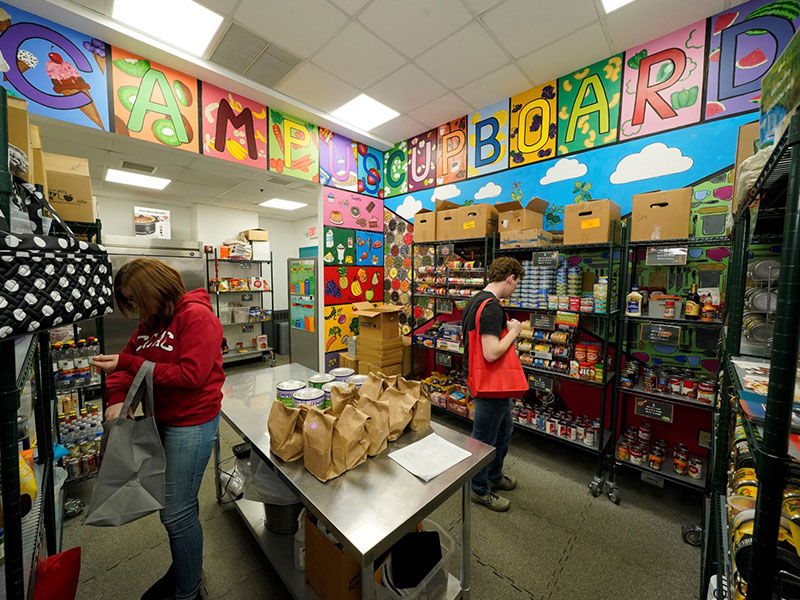CCAC Sets the Standard for Helping Students Meet Basic Needs

Students browse the shelves at one of CCAC’s Campus Cupboards.
CCAC Best practices model assists national nonprofit in the development of a new resource to help colleges improve student access to public benefit programs.
Pittsburgh
The Community College of Allegheny County (CCAC), a leader in providing resources to help students meet their basic needs, was one of a select group of national experts and model colleges invited to contribute to the development of a new resource, “Benefits Access for Student Success: A Toolkit for Leveraging Data to Find Eligible Students.” The new toolkit, designed by Benefits Data Trust (BDT) and released last month, will help colleges identify students who are eligible for untapped public benefits that can help them persist and succeed in college by paying for food, health care, internet service and other necessary expenses.
BDT is a national nonprofit with nearly 20 years of experience in harnessing the power of data, technology and policy to provide efficient and dignified access to assistance in order to improve people’s health and financial security.
The initiative to create the toolkit was first announced during the White House Conference on Hunger, Nutrition and Health in September, part of new private sector commitments made nationally to end hunger and reduce diet-related disease by 2030.
National research studies conducted by The Hope Center and the Center for Community College Student Engagement found that over one-third of students struggle to pay for food and housing while attending college, with rates disproportionately higher for students of color and Indigenous and LGBTQ+ students. Federal benefit programs can help students cover these expenses, yet they remain underutilized.
Made possible with funding from Comcast NBCUniversal, the toolkit’s development was guided by feedback from a volunteer advisory committee of national and institutional leaders and experts in student access that included Dr. Mary Utter, CCAC dean of students. The BDT Advisory Council was instrumental in developing the tool for use by other higher education institutions.
CCAC is at the forefront of providing critical services to students with essential need insecurities. This commitment is evidenced by the many services we provide students as well as our alignment with the BDT initiative that will help students succeed.
CCAC ensures students enrolled in the college have access to the resources they need through a variety of services, including:
Resource Navigators: These are CCAC administrators who work one-on-one with students to connect them to benefits they qualify for.
Essential Needs Form: In spring 2022, CCAC launched an Essential Needs form for students to submit when they have barriers related to food, housing, transportation, technology, books, childcare and more. Resource Navigators then work with students to connect them to appropriate resources both on and off campus. This form serves as a one-stop shop, and the information provided can be used to approve a student for a whole host of benefits, including the GAP Emergency Fund.
Emergency GAP Fund Scholarship: This is the CCAC Educational Foundation’s most significant way of providing direct support to students with emergency financial needs that may prohibit them from continuing their education at CCAC. Students may use these funds to pay bills, buy essentials or purchase textbooks.
Campus Cupboards: Each CCAC campus location has a food cupboard that is open to any student who needs to use it. The goal is to meet the nutritional needs of students so that they can focus on their learning and be successful.
Campus Closets: Currently located at South and Boyce campuses, the campus closets provide students with business and formal attire at no charge. The clothing is appropriate for a variety of uses, such as special events, job interviews, job fairs and more. This is not a lending system; any items students select are theirs to keep!
Loaner Laptops: Utilizing federal funding received during the pandemic, CCAC purchased laptops to be used by students in need of technology assistance. These laptops are checked out at the library and are on loan to students for the duration of their CCAC education. This helps to remove a barrier that may otherwise keep students from enjoying the full range of educational opportunities available to them at the college.
Benefits Eligibility and Access: Dr. Utter and CCAC’s Resource Navigators started working with Benefits Data Trust in 2021 to streamline the process of applying for benefits. Through this partnership, CCAC students work one-on-one by phone with BDT’s trained benefits specialists to be screened for benefit programs and then apply for those benefits. The benefits specialists can screen and apply callers for 14 benefits at once based on a single set of questions, rather than requiring students to provide the same information and documentation repeatedly through separate applications. The process is easy for students as the BDT specialists are knowledgeable and create a kind, person-centered experience for the caller.
BDT’s new toolkit is designed to help higher education institutions identify and inform students who are likely eligible for programs such as SNAP (formerly Food Stamps), the Federal Communications Commission’s Affordable Connectivity Program (ACP) for discounted broadband service, Medicaid, the Child Tax Credit, and the Special Supplemental Nutrition Program for Women, Infants, and Children (WIC). The toolkit is the first in a series of resources aimed at helping colleges notify students about their eligibility and provide information about how to apply.
About Benefits Data Trust
Benefits Data Trust (BDT) improves health and financial security by harnessing the power of data, technology, and policy to provide dignified and equitable access to assistance. Together with a national network of government agencies and partners, we efficiently connect people today to programs that pay for food, healthcare, and more while helping to modernize benefits access for tomorrow. A nonprofit since 2005, BDT has secured more than $10 billion in benefits for households across the country, helping to reduce hunger and poverty and build pathways to economic mobility. Learn more at www.bdtrust.org.
